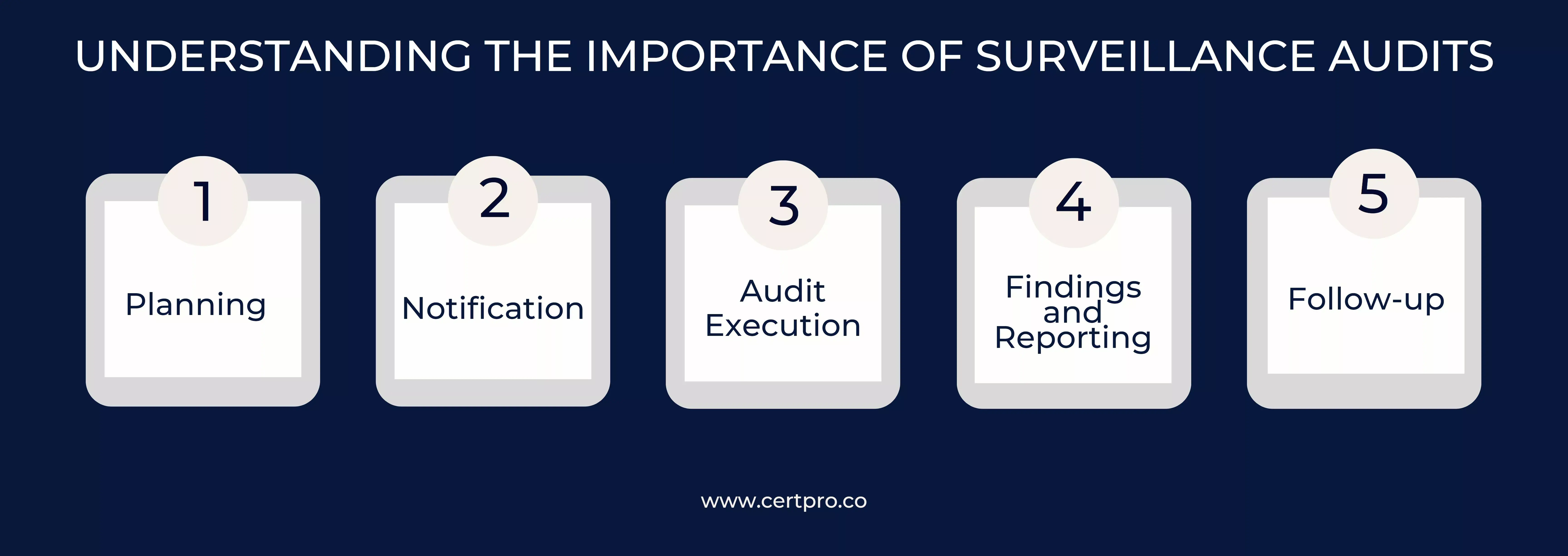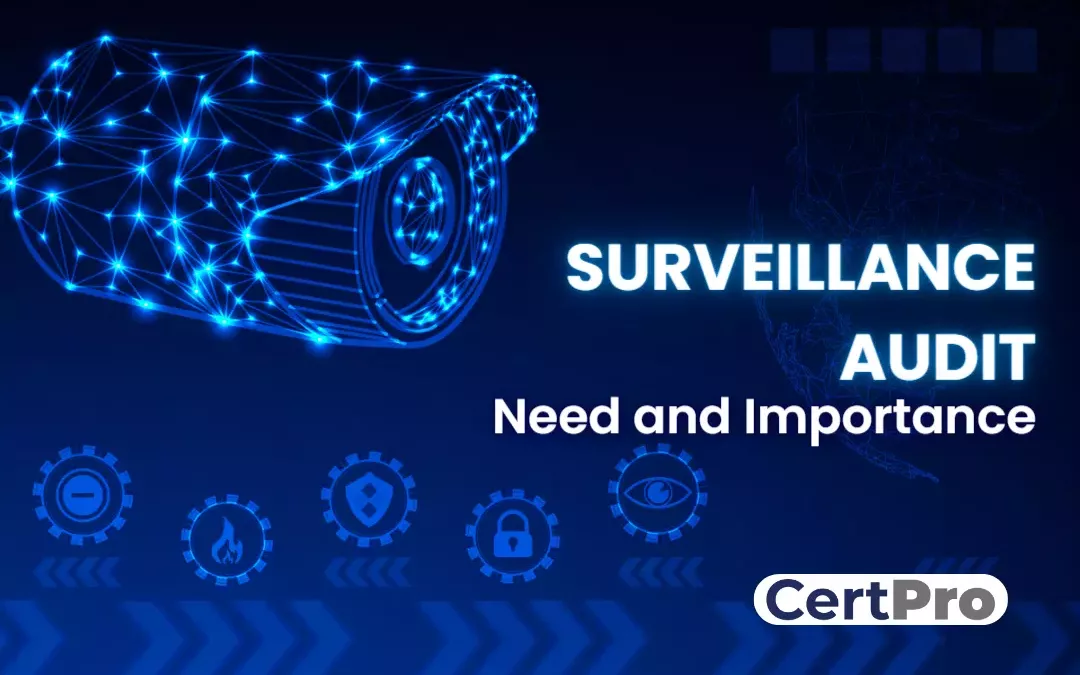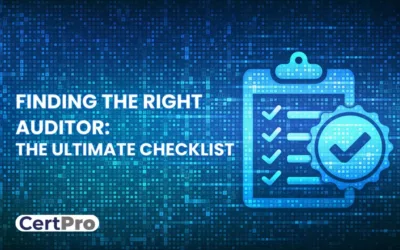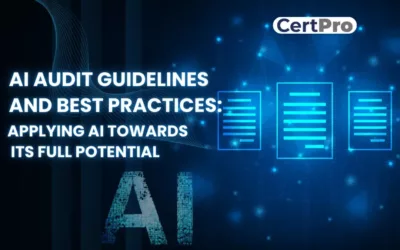Organizations need to take proactive measures to safeguard sensitive information in areas prone to data breaches and security risks. Conducting regular audits is a crucial technique for ensuring compliance with specified security measures and identifying potential hazards. These audits surpass standard compliance checks as they provide a comprehensive assessment of an organization’s security procedures.
The value of surveillance audits cannot be overstated. They play a critical role in uncovering security vulnerabilities and weaknesses in an organization’s security architecture. By thoroughly analyzing policies, procedures, and security controls, auditors can pinpoint problem areas and recommend remedial measures. This proactive approach empowers firms to bolster their security posture and minimize the likelihood of security breaches.
Surveillance audits ensure that organizations remain aligned with emerging requirements such as the General Data Protection Regulation (GDPR), the Health Insurance Portability and Accountability Act (HIPAA), and ISO 27001. By demonstrating compliance, organizations can instill confidence among consumers, partners, and regulatory authorities. This article explores the significance of surveillance audit checklists and audits in safeguarding data integrity, mitigating threats, and enhancing overall security.
WHAT IS SURVEILLANCE AUDIT?
A surveillance audit is a sort of audit that is performed to examine and verify an organization’s or system’s continuing compliance with certain standards, rules, or requirements. It is a follow-up audit performed following an initial certification or registration audit.
A surveillance audit is performed to ensure that an organization or system meets the stated standards or criteria over time. It aids in the monitoring of the efficacy of the deployed processes and systems as well as the identification of any possible non-conformities or opportunities for improvement.
Depending on the certification or regulating authority and the specific criteria, the frequency of surveillance audits varies. Organizations often face surveillance audits on an annual or frequent basis to maintain their certification or compliance status. Surveillance audits are distinct from initial certification audits, which are performed when an entity seeks initial certification or registration against a certain standard or regulatory framework.
UNDERSTANDING THE IMPORTANCE OF SURVEILLANCE AUDITS
A surveillance audit is a continuous evaluation procedure that is performed on a regular basis to verify whether an organization is still meeting the requirements established by applicable security standards and regulatory organizations. Surveillance audits analyze the organization’s continuous adherence to established norms, as opposed to the original certification audit, which focuses on establishing compliance.
Surveillance audit entails a thorough examination of a company’s policies, processes, and security controls. They assess the efficacy of existing security measures, detect vulnerabilities, and assure legal, industry-specific, and internal compliance. Organizations demonstrate their commitment to maintaining a strong security posture and continually improving their security processes by undertaking frequent surveillance audits.
Surveillance audits are usually performed on a regular basis, with the frequency defined by the certifying or regulating authority. The following steps comprise the audit procedure:

- Planning: The auditor plans the audit’s scope, goals, and criteria in accordance with the particular needs of the organization, previous audit findings, and the requirements of the standard under audit.
- Notification: The auditee is told about the impending surveillance audit in advance, including the audit date, scope, and any special areas of attention.
- Audit Execution: To assess the organization’s compliance, the auditor conducts on-site or remote inspections, interviews, document checks, and other verification operations. They collect information to back up their conclusions and may discover nonconformities or opportunities for improvement.
- Findings and Reporting: The auditor collects his or her findings, which include observations, non-conformities, and areas for improvement. They give the auditor a report outlining their findings and suggestions.
- Follow-up: In future surveillance audits, the auditor examines the efficacy of corrective actions taken in response to earlier non-conformities. They may also evaluate progress toward attaining the improvement possibilities outlined in previous audits.
THE NEED FOR SURVEILLANCE AUDIT
Organizations benefit from surveillance audits in a variety of ways. Here are some of the main reasons why surveillance audits are required:
1. Surveillance audits guarantee that firms continue to meet the requirements of applicable standards, rules, or certifications. They give continual assurance that the organization’s management systems, processes, and practices are in accordance with predefined standards.
2. Surveillance audits evaluate the long-term efficacy of deployed procedures and systems. They assist companies in identifying possible gaps, non-conformities, or areas for improvement, allowing them to take corrective steps and make required modifications to maintain optimal performance.
3. Surveillance audits may be required by regulatory organizations in specific businesses or sectors as a condition of retaining licenses, certificates, or legal compliance. Organizations must be audited on a regular basis to verify continuous compliance with regulatory standards.
4. Surveillance audits enable firms to monitor their performance in relation to specified standards, objectives, or targets. Organizations may analyze their progress, identify areas of strength and weakness, and make educated decisions to enhance performance by evaluating audit findings.
5. Surveillance audits assist firms in ensuring the quality and consistency of their goods, services, and procedures. Organizations may maintain and improve their quality management systems by confirming compliance with standards, resulting in increased customer satisfaction and loyalty.
Organizations may proactively resolve nonconformities, enhance their systems and processes, and remain ahead in an increasingly competitive and regulated business environment by performing frequent audits.
THE IMPORTANCE OF SURVEILLANCE AUDIT
Surveillance audits are less thorough than certification audits. It is taken at the time of the audit to confirm that the company is currently satisfying the major aspects of the ISO standard. One of the major topics they cover while auditing is:

- Identifying Security weaknesses: Surveillance audits assist firms in identifying security weaknesses in their framework. Auditors can identify areas that require attention by assessing policies, processes, and security controls, such as poor access restrictions, obsolete software, or insufficient security training. Identifying these holes enables businesses to quickly implement remedial steps and strengthen their security posture.
- Risk Mitigation: Surveillance audits are critical to risk mitigation. Organizations can address potential threats before they are exploited by identifying vulnerabilities and weaknesses. Addressing weaknesses in physical security, network infrastructure, personnel behaviors, and data processing processes are all part of this. Regular surveillance audits offer a methodical approach to risk management and help to decrease the possibility of security issues.
- Compliance: Compliance with security standards and laws is a continuous process, not a one-time occurrence. Surveillance audits guarantee that firms comply with developing requirements such as the General Data Protection Regulation (GDPR), the Payment Card Industry Data Security Standard (PCI DSS), and ISO 27001. Customers, partners, and regulatory authorities may all gain trust and confidence by demonstrating compliance through surveillance audits.
- Increased Incident Response: When a security issue occurs, an organization’s capacity to respond quickly and effectively is critical. Surveillance audits evaluate an organization’s incident response strategies, which include the stages of identification, containment, eradication, and recovery. Organizations may discover deficiencies and enhance their incident response skills by examining these plans and performing simulated exercises.
- Third-Party Risk Management: Many businesses rely on third-party suppliers for a variety of services, such as data storage, software development, and cloud infrastructure. Surveillance audits assist in assessing these suppliers’ security posture, ensuring they satisfy the needed requirements and preserve sensitive information. Regular audits aid in the maintenance of third-party partnerships and the reduction of the risk of data breaches or compromises throughout the supply chain.
CERTPRO: YOUR LEADING PARTNER FOR EFFECTIVE AUDIT SOLUTIONS
CertPro surveillance audits are critical in today’s complex and ever-changing security world. We provide enterprises with a proactive and rigorous approach to risk management, compliance, and overall security posture. CertPro surveillance audits enable firms to keep a competitive advantage against prospective attacks by identifying security weaknesses, minimizing risks, and encouraging continuous development. Furthermore, these audits build faith and certainty in customers, partners, and regulatory agencies, acting as concrete evidence of an organization’s steadfast commitment to security and data protection. CertPro surveillance audits will remain a vital instrument in bolstering information security and ensuring the long-term profitability of enterprises working in an increasingly digital environment as technology advances and threats grow more complex.
FAQ
Why are surveillance audits required?
Surveillance audits must be conducted in order to identify possible security risks, assure regulatory bodies and standard compliance, manage risks proactively, preserve data integrity, and constantly enhance an organization’s security procedures.
How frequently should surveillance audits be performed?
The frequency of surveillance audits may vary based on industry rules, organizational size, and security issues. Surveillance audits are often performed yearly or semi-annually, although companies may do them more regularly if necessary.
What's the distinction between surveillance and a certification audit?
An initial certification audit is performed to assess whether a business meets the requirements for certification against a given standard. A surveillance audit, on the other hand, is performed on a regular basis following certification to guarantee continued compliance and continual development.
Can surveillance audits strengthen regulatory compliance?
Surveillance audits are essential for ensuring compliance with industry-specific legislation and standards. They demonstrate an organization’s dedication to satisfying regulatory obligations, which aids in the development of confidence with consumers, partners, and regulatory agencies.
Are surveillance audits only for large organizations?
No, surveillance audits are applicable to all sizes of enterprises. All firms, regardless of size, must secure highly confidential data, keep track of risks, and maintain compliance with rules and regulations.

About the Author
SUBBAIAH KU
Subbaiah Ku is the Regional Director for CertPro in Oman, bringing a wealth of expertise in process and system auditing. As a seasoned lead assessor, Subbaiah is dedicated to ensuring the highest standards in compliance and security. His unique blend of technical acumen, rooted in Mechanical Engineering, is complemented by a diverse range of certifications and extensive training.
FINDING THE RIGHT AUDITOR: THE ULTIMATE CHECKLIST
Selecting an auditor to implement industry-specific rules and regulations is vital. The choice can influence the company’s growth and financial health. Therefore, choosing the right auditor offers valuable insights and ensures compliance and economic stability. You...
AI Audit Guidelines and Best Practices: Applying AI Towards Its Full Potential
Artificial Intelligence is entering different industries, where it is used for customer handling, data management, and documentation processes. The interference of AI is increasing concerns regarding ethical practice and safety. Therefore, AI audits have become more...
AUDIT LOG: INFORMATION SECURITY BEST PRACTICES FOR BUSINESSES
An audit log is the best information security practice for organizations. This article elaborates on the operational process of audit logs and how companies utilize them for business growth. What is an audit log, and how does it work for organizations? For more...




